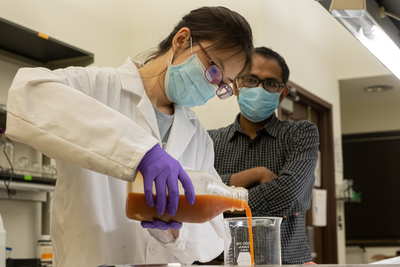Egg-based coating to extend shelf life of fruit and veg

The Brown School of Engineering lab of materials scientist Pulickel Ajayan and colleagues have developed an inexpensive micron-thick coating to protect fruits and vegetables, using eggs which would otherwise be wasted.
When the egg-based coating was applied to fresh produce by spraying or dipping, it showed an ability to resist rotting for an extended period comparable to standard coatings like wax but without some of the inherent problems.
The work by Rice undergraduate students Seohui (Sylvia) Jung and Yufei (Nancy) Cui is detailed in Advanced Materials.
Along with being edible, the multifunctional coating retards dehydration, provides antimicrobial protection and is largely impermeable both to water vapour to retard dehydration and to gas to prevent premature ripening. The coating is all natural and washes off with water. “If anyone is sensitive to the coating or has an egg allergy, they can easily eliminate it,” Jung said.
Egg whites (aka albumen) and yolks account for nearly 70% of the coating. Most of the rest consists of nanoscale cellulose extracted from wood, which serves as a barrier to water and keeps produce from shrivelling, a small amount of curcumin for its antimicrobial powers and a splash of glycerol to add elasticity.
Lab tests on dip-coated strawberries, avocadoes, bananas and other fruit showed they maintained their freshness far longer than uncoated produce. Compression tests showed coated fruit were significantly stiffer and more firm than uncoated and demonstrated the coating’s ability to keep water in the produce, slowing the ripening process.

An analysis of freestanding films of the coating showed it to be flexible and able to resist cracking, allowing better protection of the produce. Tests of the film’s tensile properties showed it to be just as tough as other products, including synthetic films used in produce packaging. Further tests proved the coating to be nontoxic, and solubility tests showed a thicker-than-usual film is washable. Rinsing in water for a couple of minutes can completely disintegrate it, Ajayan said.
The researchers continue to refine the coating’s composition and are considering other source materials. “We chose egg proteins because there are lots of eggs wasted, but it doesn’t mean we can’t use others,” said co-corresponding author Muhammad Rahman, a research scientist in Ajayan’s Rice lab, who mentored and led the team.
Jung noted the team is testing proteins that could also be extracted from plants rather than animal produce to make coatings.
Novel food processing technologies retain more nutrients in food
The potential of a range of modern techniques to improve the nutritional profiles of grain-,...
Shaking up machine changeover times on cartoning line
A food manufacturer of shakes and protein bars reduced the time taken for machine changeovers on...
Five trends set to shape Australia's food & beverage industry in 2026
Australia's food and beverage manufacturing sector is standing at a crossroads of opportunity...








